Winter Olympics 2018: empty seats a problem for organisers
Organisers of the Winter Games are enlisting the help of pop stars and schoolkids to try and get people to attend.

Organisers of the PyeongChang Games, reeling from the eyesores created by sparse attendance in the event’s first week, are blasting the airwaves with ads, hosting daily K-Pop concerts and asking local schools for help. Across the country, local municipalities have vacuumed up group tickets and offered them free to residents.
With more international tourists staying home than usual, the increasingly urgent mission is to fill seats by luring locals who have long expressed ambivalence about winter sports.
Less than 10 per cent of South Koreans said they were interested in attending the PyeongChang Games in person, according to a government survey early this year. Making matters worse, the nation is in the middle of a public holiday.
On Thursday night at JJ’s Manhattan, a sports bar in the bustling Itaewon district in central Seoul, just one of the five televisions was tuned to the Olympics. Many of the tables were empty due to the holiday.
“Koreans love soccer and baseball games. Winter sports? I’m not sure,” said Chon Yu-sun, a bartender.
PyeongChang organisers are aware of the blight created by rows of empty seats. “We have to fill the venues,” said Lee Hee-beom, chief executive of the PyeongChang organising committee, in an interview with The Wall Street Journal last year. “NBC has asked us; broadcasters have asked us to fill the stadiums.”
Ticket sales help defray the nearly $13 billion bill South Korea faces to host the Winter Olympics — nearly double the original projection of $7 billion, according to a January report by the Council on Foreign Relations. The PyeongChang Games derive most of their revenue from sponsorship deals and International Olympic Committee contributions. But ticket sales equate to visitors who buy merchandise and concessions.
To attract fans, PyeongChang organisers asked South Korea’s Ministry of Interior and Safety, which handles local-government affairs, for help, said a ministry official. “We, Koreans, believe in helping each other when in need,” the official said.
Seoul has recently scooped up 42,000 tickets, with 25 local districts receiving batches to distribute on their own, city officials say.
The Seongdong district, located in the eastern part of Seoul, recently received 1,800 of the city’s tickets and distributed them to underprivileged or socially disadvantaged residents. On Sunday, it will bus the first group of 300 to a cross-country-skiing event in the PyeongChang mountains. Interest has been high for the freebies, said a Seongdong official handling the event.
“It’s a three-to-one competition. No tickets are left,” the official said.
The PyeongChang organisers have also handed out so-called Passion Tickets to public officials, the underprivileged and volunteers.
The South Korean government’s recent ticket splurges help explain how organisers can continue to tout strong sales figures. On Friday, they said 91% of available tickets had been sold.
PyeongChang organisers say no-shows are the cause of many empty seats, as a significant chunk of tickets are earmarked for athletes, their families and sponsors. A PyeongChang spokesman declined to specify what percentage of seats those ticket blocs represented, saying it varied by venue and event.
Around lunch time on Wednesday, rows of first- and second-grade students from Cheongju Gyeongdeok Elementary School — 30 of them in total — watched the women’s Sweden-Switzerland ice hockey game. Several toted blue-and-yellow Swedish flags purchased outside the stadium for 2,000 won, or about $1.90.
Cheongju Gyeongdeok was just one of at least four different schools sending students to the game after receiving free tickets from the Ministry of Education. Some 90 students came from a middle school in Seoul, 70 from a nearby Gangneung elementary school and 28 from PyeongChang, a one-hour drive away.
In addition to schools, PyeongChang organisers are looking to attract a wider audience by scheduling daily K-pop concerts held at the medal plaza. They’ve booked popular boy bands like Super Junior and 2PM, whose full group will perform, including a member currently serving his first year of his compulsory military service.
Andrew Jeong and Brian Costa contributed to this article.
The Wall Street Journal


